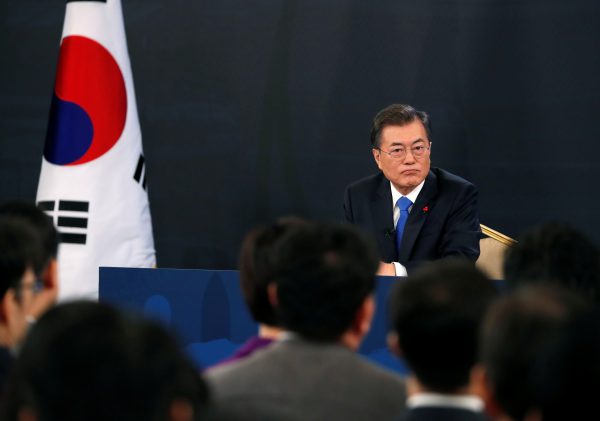The decision to change the licensing arrangement for three products — hydrogen fluoride, photoresist and fluorinated polyimide — was made at a volatile time in Japan–South Korea relations. It came after the administration of President Moon Jae-in, late in 2018, terminated the foundation that had been created with the formal agreement in 2015 to compensate ‘comfort women’ for the abuses suffered under Japanese occupation. The agreement stated that it settled the question of compensation ‘finally and irreversibly’ but was reversed by President Moon.
Then, also late in 2018, the Supreme Court of South Korea ruled that Japanese companies must compensate victims of forced labour, despite the existing 1965 Japan–South Korea Claims Settlement Agreement. The Japanese government regarded this ruling as a violation of international law but the Moon administration maintained that it could not intervene in the court’s decision.
Subsequently, the Japanese government decided to change the export control regulations on the chemical products and remove South Korea’s ‘white country’ status, with Prime Minister Abe, Chief Cabinet Secretary Yoshihide Suga and Minister for Economy, Trade and Industry Hiroshige Seko stating they had lost confidence in South Korea.
The South Korean government and its people saw this as Japanese retaliation but the Japanese government argues that the action is aimed simply to change South Korea’s export control system and practices to ensure that Japanese products were not transferred to foreign destinations of concern.
This action should not be regarded as ‘weaponisation’ or economic statecraft because it does not aim to change South Korea’s view on the forced labour issue. Weaponisation of trade means that one country forces its political will upon another country by using restrictive trade measures.
Japan’s decision to change export control regulations had a similar impact to the weaponisation of trade because it targeted three ‘choke point items’ of critical importance to South Korea. If Japan decided to restrict or embargo these items, it would effectively choke South Korea’s semiconductor industry.
Japan has not restricted or embargoed these items. It has issued licences on hydrogen fluoride and photoresist already, while an export licence for fluorinated polyimide was granted in September. Although the export volume is still small and it took time to assess individual exports, all three items continue to be exported to South Korea.
Japan has not used trade as a weapon to corner the South Korean semiconductor industry. Its actions were driven by a genuine concern that South Korea’s export controls were not being implemented appropriately, and that Japanese exports to South Korea were being diverted to end-users in China as well as countries in the Middle East and Africa.
The South Korean government sees it differently. It regards Japan’s actions as a retaliatory response to the ‘forced labour’ ruling that deliberately targets the choke point items. South Korea took the issue to the WTO General Council blaming Japan for distorting free trade principles. It also removed Japan from its preferential export licensing country list, ironically doing exactly the same thing that it blames Japan for.
Since Japan’s actions were within the framework of a national export control regime, it appears unlikely that they will be considered a violation of WTO rules. South Korea has since upped the ante, deciding to terminate the General Security of Military Information Agreement (GSOMIA) with Japan.
The decision presents a challenge to both countries. The sour relationship between them is rooted in historical grievances. The overall relationship has so far been insulated from historical issues because of the importance of the bilateral economic and security relationship.
The decision to terminate GSOMIA linked historical issues to issues of security. Though Japan shares some of the blame for failing to address the past, Tokyo believed security to be outside the scope of bilateral historical spats — particularly since North Korean nuclear and missile activities increasingly threaten both Japan and South Korea.
The decision also linked the bilateral relationship to the trilateral security cooperation framework with the United States. GSOMIA was concluded in 2016 under pressure from the United States to strengthen Japan–South Korea intelligence cooperation in response to the growing North Korean threat. Ending GSOMIA suggests that South Korea no longer wants to cooperate on this issue under this framework.
A few days before GSOMIA was to officially expire on 22 November 2019, South Korea decided to hold off terminating the pact. South Korea has also so far refrained from requesting the establishment of a panel at the WTO Dispute Settlement Body after a second round of bilateral talks at the WTO in Geneva. These decisions came as pressure from the United States mounted, with visits by the US Chairman of the Joint Chiefs of Staff Mark A Milley and the US Secretary of Defense Mark Esper. The Moon administration realised that ending GSOMIA had little impact on the Japanese government. Instead, the South Korean government found it to be more beneficial to return to consultation with Japan on export control issues.
Japan has not weaponised trade. The decision by the Moon government and subsequent dialogue on export controls proved that the problems raised by Japan could be solved through discussion.
Kazuto Suzuki is Professor at the Faculty of Public Policy, Hokkaido University.
This article appears in the most recent edition of East Asia Forum Quarterly, ‘Economics and security’, Vol. 11 No. 4.

